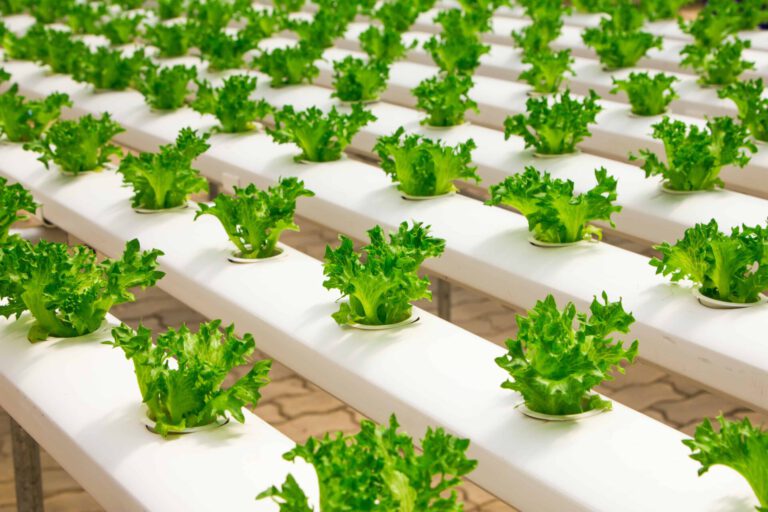The Role of Hydroponics in Food Security
Hydroponics: can it feed the Future?

In an era marked by rapid population growth and shifting climate patterns, ensuring global food security has emerged as one of the paramount challenges of our time. Traditional agriculture, reliant on arable land and favorable weather conditions, faces increasing limitations. In this context, hydroponics, a soilless farming technique, has emerged as a beacon of hope for sustainable and reliable food production. This revolutionary method offers a multitude of benefits, but it’s not without its challenges. In this article, we will explore the pivotal role of hydroponics in enhancing food security, while also examining some of its potential drawbacks.
1. Resource Efficiency
By delivering precise amounts of water and nutrients directly to plant roots, hydroponics reduce water consumption by up to 90% compared to traditional soil-based farming. This mitigates the strain on water resources while alleviating the pressure on fertile lands. A regular water supply is still required however, which may be difficult in arid areas. Electricity also provides what the sun would, thereby increasing a cost and resource factor that would normally be provided by ecosystem services.
2. Year-round Production
One of the core attractions of hydroponics is its ability to operate year-round, regardless of seasonal variations. This means that crops can be grown continuously, eliminating the dependence on specific growing seasons. This consistent production can be beneficial in regions where adverse weather conditions or limited arable land pose challenges to conventional agriculture. Associated with this is the fact that hydroponics rely on a closed-loop system, meaning any malfunction or failure in pumps, timers, or other components can lead to crop loss.
3. Space Utilization
Hydroponics allows for vertical farming and other space-saving techniques, making it possible to cultivate crops in urban environments, on rooftops, or even in converted shipping containers. This innovative approach maximizes land use efficiency and enables farming in densely populated areas, reducing transportation distances and associated carbon emissions. On the flip side, achieving the right nutrient balance in the water can be difficult. Too much or too little of certain elements can lead to nutrient deficiencies or toxicities in plants. It can also be tricky maintaining the correct pH level in the nutrient solution that’s crucial for optimal plant growth.
4. Reduced Dependency on Pesticides and Herbicides
Without soil to harbor pests and diseases, hydroponic systems require fewer, if any, chemical interventions. This not only leads to healthier, more natural produce but also contributes to a safer and more sustainable environment. This, however, can be its own problem, since successful hydroponic farming requires a deep understanding of plant biology, nutrient solutions, pH levels, and system maintenance. Novice growers face a steep learning curve, which is one of the main limitations of its growth on worldwide scale.
5. Customized Nutrient Formulations
Hydroponic systems provide precise control over nutrient composition and delivery, enabling farmers to tailor the growing conditions to the specific needs of each plant variety. This level of customization results in faster growth rates, higher yields, and superior quality produce. This level of focus is only possible for certain crops though, since not all plants are suited for hydroponic cultivation. Plants like carrots, potatoes, and other root crops are challenging to grow, as they rely on soil for support and may not develop properly in a hydroponic system. This problem also extends to vining or trailing plants like pumpkins and watermelons, and highly acidic plants like blueberries. This is why you normally see leafy greens like spinach and lettuce growing in hydroponic environments, but it is also conducive for herbs, cucumbers, tomatoes and microgreens.
While hydroponics presents a promising solution to many of the challenges facing traditional agriculture, it’s not without its own set of drawbacks. These considerations, though important, are crucial for anyone looking to implement or invest in hydroponic farming. In this section, we’ll delve into some of the potential downsides of this innovative farming technique, shedding light on areas that require careful consideration and thoughtful solutions.
1. High Initial Investment
Setting up a hydroponic system can be capital-intensive. The cost of equipment, specialized lighting, and climate control technology may be a barrier for small-scale or resource-limited farmers.
2. Technical Expertise Required
Successful hydroponic farming demands a certain level of technical knowledge and expertise. Maintaining optimal nutrient levels, pH balance, and managing potential pest issues can be challenging for those new to the method.
3. Energy Consumption
The artificial lighting and climate control systems necessary for hydroponics can lead to higher energy consumption compared to traditional farming methods. This could have implications for the overall sustainability of the practice.
Hydroponics undoubtedly holds tremendous promise in the pursuit of global food security. Its resource-efficient, space-saving, and climate-independent nature make it a powerful tool in overcoming the limitations of traditional agriculture. However, it’s important to acknowledge the potential drawbacks, including the initial investment, technical expertise required, and energy consumption. As technology advances and best practices evolve, addressing these challenges will become increasingly feasible. With careful planning and innovation, hydroponics can play a pivotal role in securing a sustainable and reliable food supply for generations to come.
